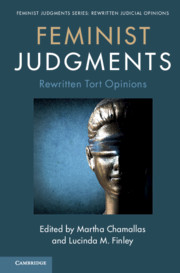Book contents
- feminist judgments: rewritten tort opinions
- Feminist Judgments Series Editors
- Feminist Judgments: Rewritten Tort Opinions
- Copyright page
- Contents
- Notes on Contributors
- Preface
- Table of Cases
- Part I Introduction
- Part II The Classics
- 2 Commentary on Palsgraf v. Long Island Railroad Co.
- 3 Commentary on Escola v. Coca-Cola Bottling Co. of Fresno
- 4 Commentary on Farwell v. Keaton
- 5 Commentary on Tarasoff v. Regents of University of California
- Part III Intentional Torts
- Part IV Negligence and Vicarious Liability
- Part V Damages
- Index
3 - Commentary on Escola v. Coca-Cola Bottling Co. of Fresno
from Part II - The Classics
Published online by Cambridge University Press: 28 November 2020
- feminist judgments: rewritten tort opinions
- Feminist Judgments Series Editors
- Feminist Judgments: Rewritten Tort Opinions
- Copyright page
- Contents
- Notes on Contributors
- Preface
- Table of Cases
- Part I Introduction
- Part II The Classics
- 2 Commentary on Palsgraf v. Long Island Railroad Co.
- 3 Commentary on Escola v. Coca-Cola Bottling Co. of Fresno
- 4 Commentary on Farwell v. Keaton
- 5 Commentary on Tarasoff v. Regents of University of California
- Part III Intentional Torts
- Part IV Negligence and Vicarious Liability
- Part V Damages
- Index
Summary
The birth of strict products liability is often traced to Justice Roger Traynor's famous concurrence in Escola v. Coca-Cola Bottling Co. In that case, the California Supreme Court allowed recovery to a waitress who had been injured when a coke bottle exploded in her hand. Although the majority based its decision on the evidentiary doctrine of res ipsa loquitur, Justice Traynor took the opportunity to present an argument for imposition of strict liability which relieves plaintiffs of proving negligence in products liability cases. The rewritten feminist concurrence joins Traynor's approach but provides additional gender, race, and class rationales for imposing strict liability in order to strengthen consumer protection and workplace safety. Situating the case in its World War II context, the feminist concurrence discusses the pressing need for providing tort protection to new classes of minority and female workers who had recently entered the work force and to consumers who had been encouraged to purchase a growing array of consumer goods. The accompanying commentary explains the legal evolution from negligence to strict product liability and delves into the facts and the people behind the case.
- Type
- Chapter
- Information
- Feminist Judgments: Rewritten Tort Opinions , pp. 54 - 72Publisher: Cambridge University PressPrint publication year: 2020



